Table of Contents
LegalTech has become the norm in the legal industry, and one area that has particularly benefitted from this technological advancement is heir search services. Traditionally, heir search involved laborious efforts to trace missing heirs, unclaimed assets, and Wills. However, with the power of technology in heir search, the process has become more accurate, efficient, and cost-effective.
Nonetheless, the human touch remains essential in verifying intricate scenarios and helping probate attorneys prevent potential data breaches. You want a forensic genealogist who not only leverages technology but also adheres to strict regulations like the ABA Model Rules of Professional Conduct.
With such expertise, it becomes second nature for a forensic genealogist to use cutting-edge technology like Artificial Intelligence, automation, data mining, Optical Character Recognition (OCR), DNA, and more. Such a quick and uninterrupted process could mean just a few months to finalize the probate process.
Moreover, the use of technology in heir search brings substantial thoroughness to the process, not to mention consistency and efficiency. Today, forensic genealogists find it easier to access vast databases, establish patterns, and present an accurate and credible report than ever.
This guide delves deeper into the use of advanced technology in heir search and the impact on the probate process.
Benefits of Technology in Heir Search

Technology can expedite finding unknown heirs and the entire process.
Heir search leverages forensic genealogy to identify heirs or beneficiaries of an estate, starting with the decedent to the living heirs.
Probate heirs search service providers identify and locate heirs guided by state laws. They also generate detailed reports, including exhibits and affidavits, to facilitate estate distribution. Their exclusive access to vital records and societies can help validate and expedite the process.
Moreover, the search may cross beyond borders, requiring a solid understanding of international laws, languages, cultural norms, and politics. Such roadblocks are the reasons you may need the assistance of a professional heir searcher. Note that your choice of researcher must be certified, insured, and licensed.
In addition to skills and access to records and databases, heir search services leverage advanced methodologies like DNA to detect fraud and verify heirship.
Here s a more detailed look of the benefits probate attorneys are likely to reap from technology in heir search:
1. Improved Efficiency

Technology enhances efficiency
Technology helps genealogy researchers speed-up routine tasks such as data collection, analysis, and presentation, reducing the time and resources required. Such efficiency allows the heir researcher and the probate attorney to cover more tasks within a short time, expediting the entire probate process and making it more reliable.
2. Cost Saving

Technology can thrash the bills significantly
Technology in heir search thrashes the high costs you would pay for research or even probate attorney services. The automation and credibility significantly reduce operational costs and allow ample time for other tasks. In addition to ensuring better utilization of resources, having few bills to pay and expediting the turnaround is proof of good-faith effort.
3. Increased Accuracy
Data analytics and advanced algorithms technology reduce the risk of human error when collecting, analyzing, or documenting heir search data. As a result, reports from forensic genealogists become more reliable and credible, which is crucial when probate attorneys want to enhance the probate process, especially the intricate ones.
4. Access to Information

Most services are offered online now.
Legal tech has enabled heir researchers to uncover information that might otherwise gone unnoticed. The probate process may involve hidden assets, unknown beneficiaries, or missing heirs, which requires the application of advanced technology to align the estate settlement process and account for every asset and heir.
Moreover, technology comes with consistent application of criteria and methodologies, preventing inconsistencies that may arise with manual processes.
5. Time-Saving

Tech can save time
Identifying heirs means having all the names, dates, and links well-detailed, which would be a hassle without technology. The list of ways tech saves time can be overwhelming, but you must be sure of having every repetitive task well taken care of.
That leaves the researcher with ample time to scrutinize any complicated scenario and conduct the proper legal analysis. Most importantly, the professionals have more time to communicate and collaborate, eventually expediting the process.
6. Adoption and Adaptation

Virtual court room is now standard practice
The world has experienced a collective mindset shift and adaptation to new technologies in the last decade, with the peak being during the COVID-19 pandemic. As a result, the use of AI, cloud computing, and Blockchain has soared significantly among law firms. Holding video conferences with interested parties, fellow professionals, and judges has become a norm.
So, with the proper application of technology, the systems favor you and make expeditious research and estate settlement a reality.
How Technology in Heir Search Helps Save Money and Time During Probate
Technology in heir research is crucial when you want to streamline the probate process. If you must find hidden assets, unclaimed assets, and potential beneficiaries, having technology in heir search becomes a necessity.
Below are the several areas where technology in heir search enhances the probate process.
1. Data Collection

Technology in heir search enhances data entry
After seeking heir search services, data collection commences, and the forensic genealogist extracts information about the decedent and potential heirs from online databases, historical documents, public records, etc.
Automated genealogy software like the Gramps and Evidentia have helped genealogists speed up data collection from different sources, ensuring minimal errors. This information is then added to the intestacy management software like EstateWorks and ProbatePlus to help the probate attorney automate and manage the process.
2. Legal Research
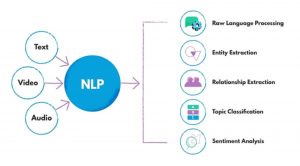
Use of NLP technology in heir search enhances legal research
Like probate attorneys, the researcher utilizes tools like Docassemble and LexNLP, which use natural language processing (NLP) to analyze legal documents and extract relevant information.
Using technology in heir search can help save time and reduce errors in the analysis of legal documents. Besides, it ensures efficient review of trusts, Wills, probate records, and heir searches in accordance with the jurisdiction’s law.
Overall, integrating these tools from heir research into the probate process improves the efficiency of information extraction and interpretation for the probate process.
3. Data Analysis
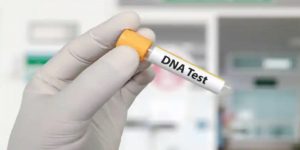
DNA test can help uncover genetic traits
Forensic genealogists need to analyze family trees, relationships, and historical data. In families with intricate structures, the genealogist creates or updates the family trees with the help of data mining analysis technologies.
Machine Learning Algorithms (MLA) can help analyze large amounts of data in a way that human researchers find overwhelming. Besides, they enhance the accuracy of identifying relationships, predicting potential heirs, and optimizing search algorithms based on historical data.
The genealogists also use DNA testing and compare the results with readily available information to identify unknown heirs, reconstruct family tees, and provide credible reports on heirships.
Using such technologies in heir search data analysis makes a strong case for the probate attorney, not to mention the quick turnaround.
4. Documentation and Reporting
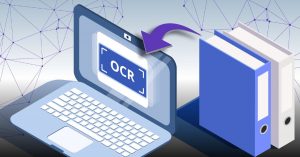
OCR tools make documenting and reporting straightforward.
Probate attorneys need a well-documented forensic genealogy report indicating the rightful heirs, their relationships, and the estate inventory to be distributed. Therefore, forensic heir hunters must document every detail and compile a comprehensive heirship report with substantial evidence.
With OCR tools like Adobe Acrobat, converting docs, PDFs, or scanned papers into searchable and editable data becomes straightforward. As a result, data from crucial resources, including handwritten records, newspapers, and historical documents, becomes readily available.
Other document management systems like SharePoint and OneDrive help document the entire heir search process, compile a report with supporting documentation, and organize information. Cloud computing has also been shown to effectively let probate attorneys, forensic genealogists, and other professionals collaborate, share data, and access databases remotely.
5. Court Presentation
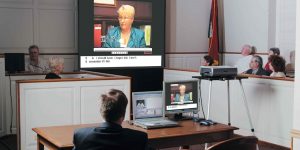
Virtual court proceeding
Forensic genealogists make up a crucial part of probate when the attorney presents a report of all the beneficiaries and assets. The genealogy report is the evidence of the attorney’s conclusion and findings about the heirship. Genealogists can use case management software like PracticePanther and MyCase to collaborate with the attorney regarding the findings, documentation, and case presentation.
Suppose the genealogist is required to testify as an expert witness. In that case, they may use software like Prezi, Google Slides, or Microsoft PowerPoint for a professional and clear presentation of findings in court with visual aids and supporting documents.
Virtual and Augmented reality technologies in heir search can also help the genealogist immerse parties in a visualizing family connection, enhancing the probate process.
Legal technology is proving to be a transformative force in the heir search and probate industry. It has revolutionized the process of searching for heirs and assets through automation, data analysis, and integration.
Probate attorneys and heir researchers who embrace these technologies can better navigate the intricacies of probate and make the process accurate, accessible, and efficient. Besides, the integration ensures that beneficiaries receive their inheritance on time, fulfilling the decedent’s intended wishes.
How Does Record Click Heir Search Specialists Help Probate Attorneys?
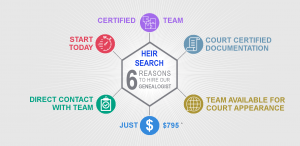
Reasons you should consider seeking RecordClick’s services
RecordClick specialists will integrate relevant technology in heir search to unravel intricate family structures and streamline the probate process. You get to enjoy in-depth local and international forensic research, non-percentage flat-rate fees, over 98% success rate, and well-documented court-ready reports. Plus, if needed, we can appear in court for testimonies.
Our professional genealogical researchers have completed tens of thousands of searches traversing various cultures, languages, and legal intricacies.
Here’s what to expect with Record Click’s heir search service:
Record Click’s heirline researchers work with and assist the attorney in finding the missing heirs to an estate. We document the evidence to validate the locating of missing heirs to an estate and provide the attorney with the necessary documents.
1. Heir Search When Estate Beneficiaries are Unknown
We can help when the estate beneficiaries are unknown, need to be located, or need proof of the relationship. We provide a simple hourly rate and do not expect or require a percentage of the estate.
2. Heir Search Experience & Credentials
We have experienced, credentialed researchers all over the USA, including in Salt Lake City, UT, the world-famous Family History Library, and international genealogical search expertise. Our researchers also have access to the constantly growing world of subscription internet services.
After your research, your report and all your records will be provided in an attractive binder.
3. Customize Based on Your Heir Search Needs
Our experts can customize your heir search for the genealogical research you need for your firm, your time frame, and your budget. Contact us today to get started on your estate settlement.
For local and international services or heir searches, firms, attorneys, and trust officers rely on Record Click for their work.
Our team of 45+ experts includes a former CIA agent, in-house DNA experts, researchers in all states, and researchers in all parts of Europe. Services included: heir German, heir search, search for heirs, heir searches, heir finders, heir finder, heir in German.
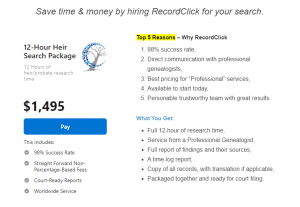
Save time and money with RecordClick heir search
Save money and time; we have the best pricing in the industry, and we’re available to start today. We’ll help you solve the unknown in your case. Please reach out to us today for more information.
We offer free, no-obligation consultations, even if you are not planning to start a search immediately.
Feel free to ask any questions — we look forward to connecting.
Contact Record Click today or schedule a call.







